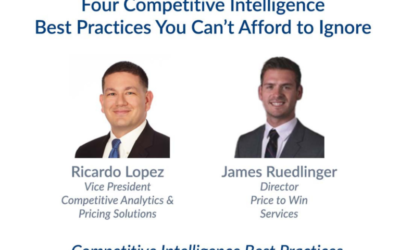Is Indecision Hurting Your Competitive Intelligence Strategy?

No matter how you practice competitive intelligence (CI), your CI program must supply valuable data that boosts your acquisition goals. Collecting actionable competitive information takes various applications to be successful.
Effectiveness is a relative term. There are so many levels of efficiency that anything qualifies as effective. Nonetheless, being able to differentiate between lower and higher levels of valuable data will motivate your bidding strategy.
So, what are the qualifiers for the effectiveness of competitive intelligence? The mission of active Competitive Intelligence should be to:
- Strengthen your company’s position.
- Understand how the buyer perceives the company’s value proposition.
- Peek into what the competition is doing.
- Figure out which industry-wide best practices apply.
- Discover new markets.
- Uncover innovative technologies.
- Help navigate the company in the right direction.
- Develop new products/services/solutions.
- Investigate and address the problems of your clients’ experience.
Indecision is an obstacle.
There are many obstacles to producing valuable competitive intelligence. The most important of these obstacles is indecision. This indecision devalues intelligence efforts. In some cases, it leads to the dissolution of the actual intelligence efforts.
What is the real problem with indecision?
The problem with indecision is that there is no agreement on focus and the results of the efforts. Often, executives will request specific bits of information while other departments create laundry lists of potential topics.
In too many cases, a strategic plan for intelligence is lacking. Evidence of this environment usually rears its head with the philosophy of “let’s grab everything we can, and once we have the data, we’ll know what to do with it.” The most dangerous symptom is a company that is very reactive in its intelligence efforts.
The truth of the matter is that this lack of system usually leads to information overload. It would be best if you prioritized your efforts for competitive intelligence to be practical. The prevailing feeling is too much data is not useful. From this point on, you will base corporate decisions on experience rather than intelligence efforts.
Without a competitive intelligence strategy that makes effectiveness a vital characteristic of success, the intelligence group is likely to marginalize its value.
3 Key Steps to Decisive Competitive Intelligence
It would help if you made your company decisive about its competitive intelligence efforts. You can do this by:
- Developing a set of effectiveness criteria.
- Measuring your strategy against its ability to be effective.
- Selling this idea to your management and on up the chain.
Create a habit of decisiveness around your competitive intelligence efforts, strategies, and plans. Otherwise, indecision will trivialize your best efforts.
Contact us for more information on competitive intelligence and how we can help you.


